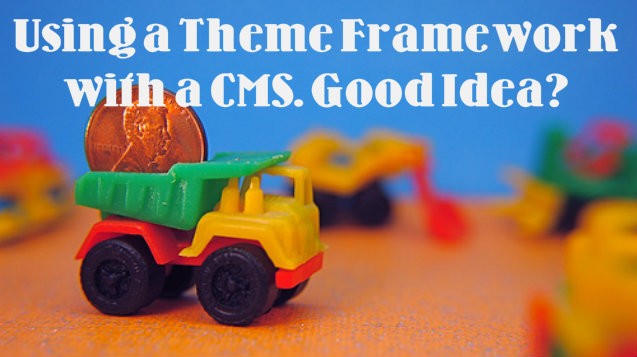These days it seems that website creation amounts to little more than picking the right content management system (CMS) and theme to suit your needs. Given that many of the best content management systems are free, even price is no longer a consideration. If a quality CMS such as Drupal or WordPress suits your needs, there’s little question about using it. If you’re a web developer, there is yet another big decision: should you use a theme framework?
If you can find a theme that your client likes, is made by a reliable developer, and also does the job (with minimal code modification), then you shouldn’t use a theme framework. However, if no such theme is available, then theme frameworks can make a lot of sense, especially when the alternative is developing your own theme from scratch. While purists insist on building themes from the ground up, this is not always practical. Three big reasons for using frameworks are time constraints, the client’s budget constraints, and limited coding experience on your part.
Frameworks save a ton of development time. Getting projects done sooner rather than later is always good for developer/client relationships. Reduced development time also means you finish the project within the budget constraints which also keeps your client smiling.
The third reason for using frameworks is a bit shaky in that developers worth their salt should be able to code. However, some developers are more entrepreneur than coder and are getting into the business from that side of the spectrum rather than from the coder turned entrepreneur side. As long as the developer delivers, keeps his clients happy, and is improving his coding skills along the way, then that shouldn’t present a problem.
As with everything else, theme frameworks have their downsides. One is flexibility. Although far more flexible than pre-built themes, frameworks still impose constraints on the website’s functionality and its overall structure. Closer inspection of two seemingly different looking websites built with the same framework does reveal similarities. For example, frameworks such as Gantry that use a rectangular grid, produce websites made up of rectangular block elements. While you can vary the number and size of these elements, they still remain rectangular blocks.
Another downside of theme frameworks is that they do not produce lean code. Framework built websites will never break page loading speed records. Given the public’s ever-increasing impatience, a slow website will cost your client a lot of lost sales and leads. To produce a reasonably quick website, you will have to employ various techniques such as caching that stores dynamic pages as static files. It is also advisable to use a fast and reliable web server.
For more information on content management systems and reliable web hosting, please contact us.
Photo by JD Hancock
